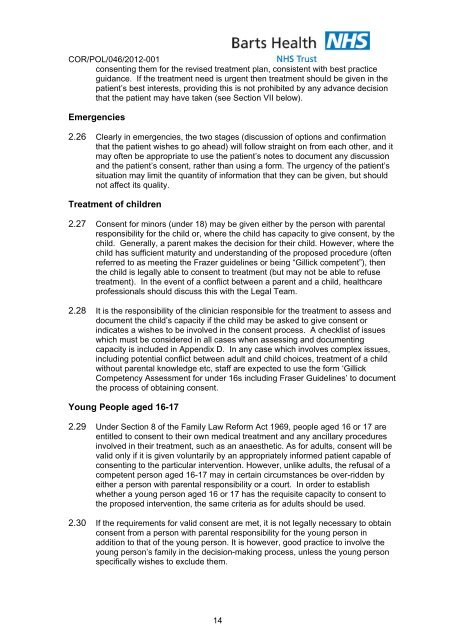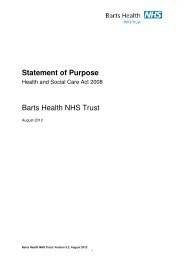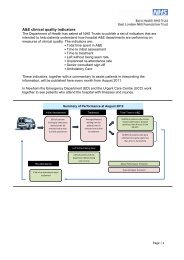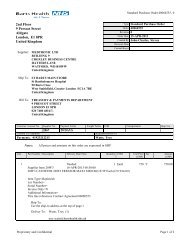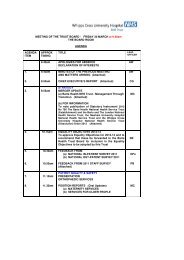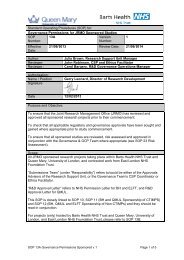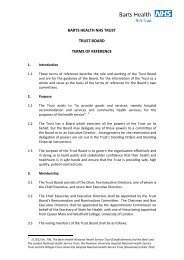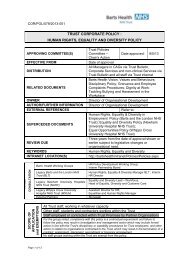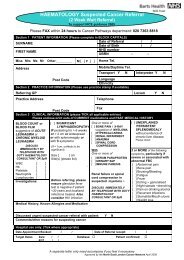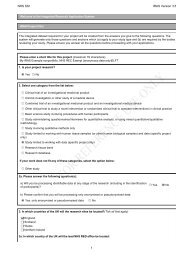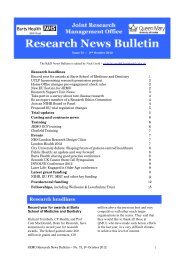Consent to examination and treatment - Barts Health NHS Trust
Consent to examination and treatment - Barts Health NHS Trust
Consent to examination and treatment - Barts Health NHS Trust
You also want an ePaper? Increase the reach of your titles
YUMPU automatically turns print PDFs into web optimized ePapers that Google loves.
COR/POL/046/2012-001<br />
consenting them for the revised <strong>treatment</strong> plan, consistent with best practice<br />
guidance. If the <strong>treatment</strong> need is urgent then <strong>treatment</strong> should be given in the<br />
patient’s best interests, providing this is not prohibited by any advance decision<br />
that the patient may have taken (see Section VII below).<br />
Emergencies<br />
2.26 Clearly in emergencies, the two stages (discussion of options <strong>and</strong> confirmation<br />
that the patient wishes <strong>to</strong> go ahead) will follow straight on from each other, <strong>and</strong> it<br />
may often be appropriate <strong>to</strong> use the patient’s notes <strong>to</strong> document any discussion<br />
<strong>and</strong> the patient’s consent, rather than using a form. The urgency of the patient’s<br />
situation may limit the quantity of information that they can be given, but should<br />
not affect its quality.<br />
Treatment of children<br />
2.27 <strong>Consent</strong> for minors (under 18) may be given either by the person with parental<br />
responsibility for the child or, where the child has capacity <strong>to</strong> give consent, by the<br />
child. Generally, a parent makes the decision for their child. However, where the<br />
child has sufficient maturity <strong>and</strong> underst<strong>and</strong>ing of the proposed procedure (often<br />
referred <strong>to</strong> as meeting the Frazer guidelines or being “Gillick competent”), then<br />
the child is legally able <strong>to</strong> consent <strong>to</strong> <strong>treatment</strong> (but may not be able <strong>to</strong> refuse<br />
<strong>treatment</strong>). In the event of a conflict between a parent <strong>and</strong> a child, healthcare<br />
professionals should discuss this with the Legal Team.<br />
2.28 It is the responsibility of the clinician responsible for the <strong>treatment</strong> <strong>to</strong> assess <strong>and</strong><br />
document the child’s capacity if the child may be asked <strong>to</strong> give consent or<br />
indicates a wishes <strong>to</strong> be involved in the consent process. A checklist of issues<br />
which must be considered in all cases when assessing <strong>and</strong> documenting<br />
capacity is included in Appendix D. In any case which involves complex issues,<br />
including potential conflict between adult <strong>and</strong> child choices, <strong>treatment</strong> of a child<br />
without parental knowledge etc, staff are expected <strong>to</strong> use the form ‘Gillick<br />
Competency Assessment for under 16s including Fraser Guidelines’ <strong>to</strong> document<br />
the process of obtaining consent.<br />
Young People aged 16-17<br />
2.29 Under Section 8 of the Family Law Reform Act 1969, people aged 16 or 17 are<br />
entitled <strong>to</strong> consent <strong>to</strong> their own medical <strong>treatment</strong> <strong>and</strong> any ancillary procedures<br />
involved in their <strong>treatment</strong>, such as an anaesthetic. As for adults, consent will be<br />
valid only if it is given voluntarily by an appropriately informed patient capable of<br />
consenting <strong>to</strong> the particular intervention. However, unlike adults, the refusal of a<br />
competent person aged 16-17 may in certain circumstances be over-ridden by<br />
either a person with parental responsibility or a court. In order <strong>to</strong> establish<br />
whether a young person aged 16 or 17 has the requisite capacity <strong>to</strong> consent <strong>to</strong><br />
the proposed intervention, the same criteria as for adults should be used.<br />
2.30 If the requirements for valid consent are met, it is not legally necessary <strong>to</strong> obtain<br />
consent from a person with parental responsibility for the young person in<br />
addition <strong>to</strong> that of the young person. It is however, good practice <strong>to</strong> involve the<br />
young person’s family in the decision-making process, unless the young person<br />
specifically wishes <strong>to</strong> exclude them.<br />
14


